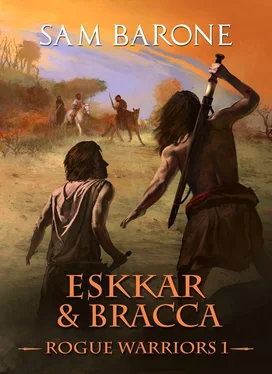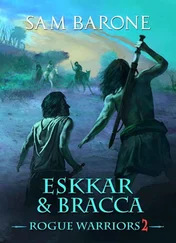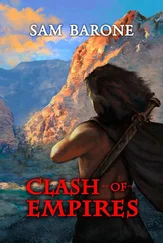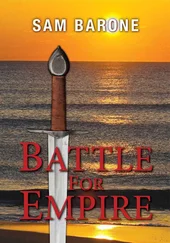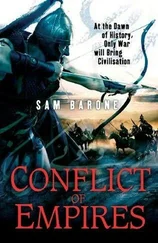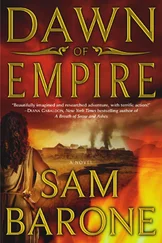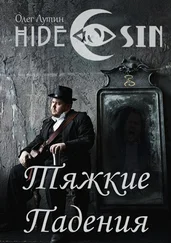Sam Barone - Eskkar & Bracca
Здесь есть возможность читать онлайн «Sam Barone - Eskkar & Bracca» весь текст электронной книги совершенно бесплатно (целиком полную версию без сокращений). В некоторых случаях можно слушать аудио, скачать через торрент в формате fb2 и присутствует краткое содержание. Год выпуска: 2013, Издательство: Eskkar Enterprises, Жанр: Исторические приключения, на английском языке. Описание произведения, (предисловие) а так же отзывы посетителей доступны на портале библиотеки ЛибКат.
- Название:Eskkar & Bracca
- Автор:
- Издательство:Eskkar Enterprises
- Жанр:
- Год:2013
- ISBN:нет данных
- Рейтинг книги:3 / 5. Голосов: 1
-
Избранное:Добавить в избранное
- Отзывы:
-
Ваша оценка:
- 60
- 1
- 2
- 3
- 4
- 5
Eskkar & Bracca: краткое содержание, описание и аннотация
Предлагаем к чтению аннотацию, описание, краткое содержание или предисловие (зависит от того, что написал сам автор книги «Eskkar & Bracca»). Если вы не нашли необходимую информацию о книге — напишите в комментариях, мы постараемся отыскать её.
Eskkar & Bracca — читать онлайн бесплатно полную книгу (весь текст) целиком
Ниже представлен текст книги, разбитый по страницам. Система сохранения места последней прочитанной страницы, позволяет с удобством читать онлайн бесплатно книгу «Eskkar & Bracca», без необходимости каждый раз заново искать на чём Вы остановились. Поставьте закладку, и сможете в любой момент перейти на страницу, на которой закончили чтение.
Интервал:
Закладка:
“And what is that to you?”
“Not long after you left, my oldest brother, Ulman, took Iltani for his wife. Two days ago, Takcanar’s men killed him, and my younger brother. They would have killed me, too, but I was out in the fields.”
“What has this to do with me?”
“I came to the village to seek help,” Zuma said. “But all those who opposed Katha and his hired killers had fled. Those that remain are too afraid even to speak to me, let alone to resist. If you cannot help us, tomorrow Katha and his sons, along with Takcanar and his men, will return to our farm. If any of us are still there, they will kill us. But if we leave, we will starve to death. Iltani and her children will all die. None of our neighbors will dare to take us in, give us work, or even feed us.”
So now there were children involved. Eskkar ground his teeth. None of this affair concerned him, and a few more dirt eaters, alive or dead, meant nothing to him. Nor had he ever shared the pleasures of the gods with Iltani. She’d still been weak from her battle with the pox when he brought her to her kinfolk. He’d wanted to spend time with her, but her grim-faced uncle and his women knew better than to let her get involved with a barbarian.
No, nothing from the past bound him to help her now, nothing except — the sword she had tossed to him. Without that old copper blade, he might have been slain in his first battle. He stared at Zuma.
“Where is your farm?” With luck, the farm would be in the opposite direction, and Eskkar would have an excuse to ignore Zuma’s pleas.
The man couldn’t keep the hope and excitement from his voice. “It’s north of here, the same direction you are going. We can be there well before dark, if we hurry.”
Eskkar grunted. Of course his luck had failed him again. First, Zuma had recognized him in the village, and now Iltani’s farm lay along the path Eskkar and Bracca needed to travel.
He turned to Bracca, still sitting on the rock, his face devoid of expression. Nevertheless, Eskkar knew his companion would be savoring this turn of events.
“Bracca, it’s on the way.” Eskkar hated the pleading tone that slipped into his voice. “We can spend the night at the farm, get something to eat, and be on our way before dawn. If Iltani and her kin want to join us, we can journey with them until they reach some safe place.”
“Then we might as well get moving.” Bracca rose and stretched his arms. “We haven’t had a good meal in days. If they’re going to lose their farm, I’m sure they’ll be able to spare a chicken or two for us. And I can’t wait to meet Iltani.”
Eskkar swore again, and started north, this time stretching his legs. Without looking at Bracca, Eskkar could almost feel the wide grin on his companion’s face. No matter how this turned out, Eskkar knew Bracca’s sarcastic remarks would last for days.
The sun still hung well above the horizon when the three men circled the base of a rocky outcrop. Half a mile ahead, Eskkar saw the farm. As they drew closer, he counted two holding pens for the animals, three low structures that must be living quarters, and a high walled enclosure where the farmers would store their grain, seeds, and anything else they harvested. A narrow stream only a few paces wide separated the pens from the huts.
Irrigation ditches branched off from the flowing water, then divided into an ever increasing number of mud-banked channels that carried the precious liquid to the crops. Even Eskkar knew that a farm this size, and with a fresh water stream running through it, would be a valuable one.
Zuma ran past Eskkar, splashing across the waterway and shouting Iltani’s name. Eskkar and Bracca followed more slowly, as they stepped down into the water. By then the huts had emptied, and Eskkar counted seven children, three women, and two men. One man and his wife were old, easily in their late forties or early fifties, and they appeared even older than that. The other woman, probably the wife of the younger brother Takcanar had recently killed, appeared about the same age as Iltani.
Farm labor aged a man faster than any other work, and proved even harder on women. They lived little better than slaves, forced to work all day and pleasure their husbands at night. Even if a woman didn’t die in childbirth, they aged rapidly and died well before their men folk. Many young girls could not stand the thought of the never-ending drudgery, and deserted both farm and family.
Glancing around, Eskkar wondered how anyone could contemplate living the life of a dirt eater. The Alur Meriki, the most powerful and dangerous of all the steppes clans, held dirt eaters in the lowest contempt, scarcely better than animals, and killed them without compunction whenever the warriors raided these lands.
Iltani, wiping her hands on her ragged dress, kept her eyes fixed on Eskkar as he approached. Zuma, meanwhile, tried to explain how he had come across the two fighters, but Iltani ignored his excited utterances as she moved past him.
“Eskkar. It is you.” Her voice was soft, almost melodious, but her words carried authority. “I have often wondered what became of you, if you survived.”
Eskkar recognized her face, though the skinny girl he carried on his horse had changed greatly. Her body had thickened from the burden of child bearing. Likely her husband had not even waited until she passed through the rites and joined the women before taking her. Uncombed long hair already streaked with gray, hung around her face, as if to conceal the scars from the pox on her cheeks. But her eyes remained as he remembered them, dark, intelligent, and fearless.
“Iltani. It is good to see you again.” Eskkar gestured toward Bracca. “This is my friend, Bracca. We were in Norvel when Zuma found us.”
Bracca stepped forward, moving to Eskkar’s side. “Actually, we’d just been chased out of the village by Takcanar and his men. By chance we happened to be going this way, and Zuma brought us here. Eskkar was very excited at the chance to see you again. He never stopped talking about you.”
A faint smile crossed Iltani’s face. “Your friend has smooth words, Eskkar. But you both must be hungry and thirsty.” She turned to the other women, still standing there, mouths open. “Water for our guests, and bread and dates. They’ll be hungry walking all the way from Norvel.”
Eskkar glanced at Zuma and the other two men. The old man, permanently stooped from working in the fields, appeared as confused as the old woman. The young man probably had less than fourteen seasons, but already his face looked slack and his eyes dull. Zuma was the only one whose wits might be quick enough to help.
Iltani invited the two visitors inside the largest hut, but both Eskkar and Bracca shook their heads. Eskkar had already seen a chicken amble out of the hut, and a room full of children and farm animals would stink almost as much as a pig pen, and probably be just as infested with bugs, mice, and spiders. Eskkar preferred to sleep outdoors, away from the cramped and crowded conditions. Not that he and Bracca intended to sleep here.
Eskkar had already made up his mind, and it took only a quick glance at Bracca’s face to see he had arrived at the same conclusion. Iltani and her family should abandon the farm and move north. Nothing here was worth dying for.
“Iltani, we’ll take whatever food you can spare. But we can’t stay here. If we all start moving now, before it’s dark, we should be able to get far enough away so that by morning, this Katha won’t bother chasing after you.”
“We’ll share our food with you, Eskkar, but I’m not leaving my home. I’ve buried a husband and two of my children here, and raised three others. I won’t be driven from my own land.”
Читать дальшеИнтервал:
Закладка:
Похожие книги на «Eskkar & Bracca»
Представляем Вашему вниманию похожие книги на «Eskkar & Bracca» списком для выбора. Мы отобрали схожую по названию и смыслу литературу в надежде предоставить читателям больше вариантов отыскать новые, интересные, ещё непрочитанные произведения.
Обсуждение, отзывы о книге «Eskkar & Bracca» и просто собственные мнения читателей. Оставьте ваши комментарии, напишите, что Вы думаете о произведении, его смысле или главных героях. Укажите что конкретно понравилось, а что нет, и почему Вы так считаете.
